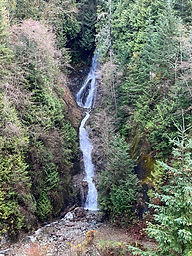Village Residents Plan to Revolutionize Agriculture Industry
- kc dyer
- Jul 26, 2023
- 4 min read
Company Founded Over a Campfire has Big Ambitions

At the moment, Peter Gross is 'Mountain Drive-famous', and for good reason. The past few years have brought Lions Bay an uncharacteristic amount of snowfall, and Peter not only has an epic driveway, but regularly leaves a sled at the bottom for passers-by who care to take a run or two. Every kid on the street –and even a few of the grown-ups– loves him for it.
But Gross, along with a couple of his Lions Bay pals, has set his sights on revolutionizing more than just the neighbourhood sledding run. Michael Riedijk, Jose Godoy Toku and Gross are the founders of Lucent Bio, and if things go according to plan, big changes are afoot.
More than ten years ago, the three neighbours took a few family camping trips together, and after a confab or two over a beer and a bonfire, started their own company in 2014. Gross, whose background is in physics and engineering, left his job with Aquatica Submarines to take on the role of Chief Technical Officer of this new venture. Riedijk, with an industrial engineering background, stepped in as CEO. Toku, coming from law, is director of business development in Latin America. The three joined forces with Jason McNamee, the only non-resident of Lions Bay, who took on the role of Chief Operating Officer.
As a group of science and business nerds who were worried about the impacts of climate change, Gross says the initial plan had been to find a way to return nutritional support to rapidly depleting plankton in the deep oceans. Ocean plankton is responsible for much of the world's oxygen production, as well acting as a sink for carbon, and the plankton is under stress primarily because changing wind patterns across the globe mean airborne micronutrients needed for efficient photosynthesis are no longer available.
The new company, Lucent Bio, managed to secure research space with 4D Labs at Simon Fraser University (SFU) through a public-private partnership in 2015. They began to investigate how to merge micronutrients –like much-needed iron–with a benign substance that is not water-soluble. In other words, they were looking for a solution that would allow iron to float among the plankton, and not just sink to the bottom of the ocean. After extensive research, the ideal product turned out to be the discarded hulls of rice and lentils, which take the form of cellulose. This waste product in the food industry is plentiful and a perfect match. However, while they were succeeding on the research front, the company struggled to find a route into the complex world of fisheries and oceans governance.

Successful trials using these nutrients on lettuce led to an epiphany. The product, which its inventors called Soilios, also showed huge benefits to land-based plant life. And so, just before the pandemic in 2019, Lucent pivoted to focus on reinventing agricultural fertilizers that Gross says will work with the environment, rather than against it.
Current fertilizer technology is a century old, with ingredients that are often dangerous to animals and insect life, and poisonous to ground water. Using high-tech equipment through their partnership with SFU, Lucent is experimenting with bonding iron and other nutrients to a natural cellulose that is 45% carbon. Gross explains this will actually improve soil health, rather than depleting it like conventional fertilizers. The fact they are non-water soluble keeps the micronutrients available to the plants and not washed away into ground water.
While much research at SFU ground to a standstill during the pandemic, Gross says Lucent still moved forward. Today, in addition to their lab work, they occupy almost all of the greenhouse space on campus, with testing underway on many plant varieties. "We've been unbelievably lucky working here," says Gross, walking through one of the Lucent labs. "We have access to the highest level equipment at a reasonable rate, which allows us to move forward with some pretty exciting innovations."

With support from the National Research Council, the company now has 45 employees. This includes Isabelle Riedijk, who grew up in Lions Bay, and is currently working as a summer student for her dad's company. "It's really fun," she says, shrugging off the intense heat inside the greenhouse. "We have to set up lots of fans, but you don't really notice it, after a while."
The goal of the company is to deliver crop nutrition that improves yields and soil health while also sequestering carbon. "We're trying to create a sustainable way to help farmers increase yields while also improving the health of the soil, rather than depleting it," notes Gross.
In addition to iron, Lucent is experimenting with other micronutrients like zinc and manganese. And Gross doesn't discount the possibility of also moving into macronutrients. "If we can find a sustainable way for farmers to increase their yields, and then license that technology to the giants in the agriculture industry, it could be world changing."
It seems that thinking big comes pretty naturally to a guy with the best sledding run on Mountain Drive.
The Watershed wants to celebrate the accomplishments of village residents. Got thoughts to share? Leave your comments below, or email us at editor@lionsbaywatershed.ca


Comments